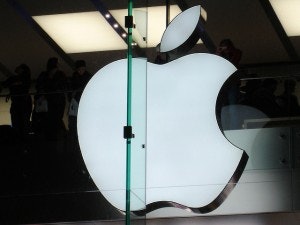Apple Inc. (NASDAQ:AAPL) has underperformed the market in dramatic fashion over the past year. The company’s shares are down 26.6% in the past twelve month,s while the NASDAQ Composite is up 8.5%; even Microsoft Corporation (NASDAQ:MSFT) is up 3.5%. The Street has built in expectations of lower growth in Apple’s earnings, and investors demanded returning some of its $142 billion cash balance to shareholders. This is strikingly similar to what happened at Microsoft Corporation (NASDAQ:MSFT) in the early 2000s.
Apple Taking Actions to not be the Next Microsoft

Apple Inc. (NASDAQ:AAPL) does not have the significant product launches to drive high earnings growth. The iPad and iPhone became standards in product categories that Apple essentially created, and it has penetrated new markets with these offerings, which extended its period of high growth, but that is beginning to wane. There is no new category or product known or expected in the Apple portfolio, so lower growth and potential margin erosion is expected. However, Apple Inc. (NASDAQ:AAPL) can still grow and, most importantly, generate cash. If it essentially transforms its view from the Street into an income/growth stock versus just growth, it can find new investors and support or even drive its share price higher.
While hanging onto some cash as dry powder for investment or to deal with economic downturns is a good thing, holding onto too much of it is viewed unfavorably by investors. Investors do not like companies to keep significant cash surpluses. In strictly financial terms, the $142 billion on the books at Apple Inc. (NASDAQ:AAPL) is actually worth less than $142 billion to an investor. The money is not working to generate a return for non-controlling stockholders when it is truly excess cash. Since a shareholder cannot use this cash for anything, mainly to generate an investment return, the cash actually should be discounted at the equity risk premium to a date when it will start generating a return for the shareholder or the company. Apple Inc. (NASDAQ:AAPL) has announced it plans to return $100 billion to shareholders by 2015. Depending on FCF generation through 2015, this number should probably push even higher.
Apple Announce $17 Billion Bond Offering
The Wall Street Journal reported on April 30, 2013 that Apple Inc. (NASDAQ:AAPL) plans to issue $17 billion in bonds, the largest ever corporate offering. The shares rose almost 3% following the news, so clearly the move was viewed positively. The maturities are staggered, and range from 3 – 30 years, with two of the offerings at a variable rate. Some may ask why Apple is borrowing money if it already has significant excess cash on hand. First, Apple earned a significant portion of its cash outside the United States. While it paid foreign taxes on this, it did not have to pay income tax a second time to the US government, which current tax law requires. Apple Inc. (NASDAQ:AAPL) has a policy, as do many large corporations, to leave this cash abroad potentially for use in foreign investment unless the tax law changes. Hence, it needed cash in the US to payout the dividends with. Second, bond rates are low, and companies that generate consistent FCF and have no debt have issued bonds, paid dividends with them and paid that off with future cash flows to generate value for shareholders.
Conclusion
Management’s decision to return cash to shareholders and willingness to take immediate action to do so is a positive that means value and income investors can now look at owning Apple Inc. (NASDAQ:AAPL). Supporting versus fighting the shift away from growth investors can only help the price of the shares. Apple may have found its bottom and may have righted the ship. That said, Apple investors still need patience. It is on the road to finding new core long-term holders, something that could not be said six or even three months ago.
The article Apple Is Making Sure It Doesn’t Become Microsoft originally appeared on Fool.com and is written by Mike Thiessen.
Copyright © 1995 – 2013 The Motley Fool, LLC. All rights reserved. The Motley Fool has a disclosure policy.


